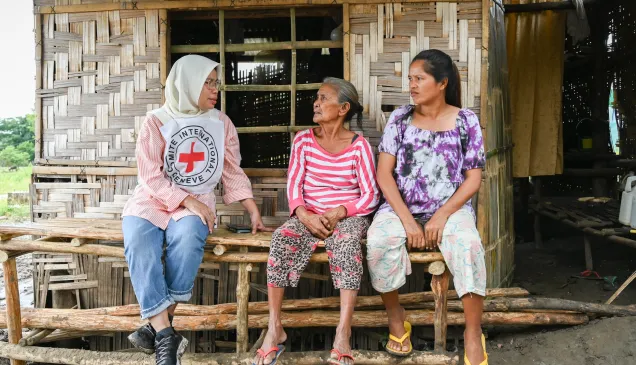Health Care in Danger: News
The Health Care in Danger project was a central topic at the 12th African Union – ICRC joint seminar in Addis Ababa. Similarly, other events and workshops took place over the last few months.
States have a key role in preventing violence against health-care personnel and facilities. In this connection, a high- level panel debate took place in New York in September, on the margins of the 69th session of the UN General Assembly. It brought together ICRC President Peter Maurer, WHO Director-General Margaret Chan, UN Deputy-Secretary-General Jan Eliasson, OCHA Under-Secretary-General Valerie Amos, government representatives from Norway and Sweden, and the former Minister of Health of Côte d'Ivoire. All the panellists, and speakers from the audience, called for all those concerned, particularly States, to be more actively involved in ensuring the implementation of concrete measures to protect access to and deliver y of health care. Specific reference was made to implementing the measures that emerged from the HCiD experts' consultations and workshops, such as adopting strong domestic legislation for protecting health-care personnel and facilities, medical vehicles and patients, sharing good practices and adopting a UN resolution on preventing violence against health care. The ICRC presented a position paper containing key recommendations for States, on protecting their health-care systems and making them more resilient.
***
In July, the Colombian Ministry of Health, with support from the Colombian Red Cross and the ICRC, organized a regional workshop in Bogotá, Colombia. The event gave National Red Cross and Red Crescent Societies and government representatives a platform for exchanging good practices from throughout Latin America and for finding solutions to the problem of disregard for health services. Participants described the various risks to health-care services across the continent; afterwards, working groups discussed the measures that have been taken to reduce the vulnerability of health-care services, and further action in this regard.
***
In September, the HCiD project was presented at the annual conference of the International Pharmaceutical Federation (FIP) in Bangkok. During the HCiD session, participants learnt about the risks pharmacists were exposed to during emergencies and about strategies for mitigating them. The recommendations that emerged from the HCiD experts' consultations and the HCiD platform attracted a great deal of interest. The FIP declared its willingness to pursue the subject of HCiD further with the Movement.
***
In September, the Norwegian Red Cross organized a workshop in Cartagena, Colombia, on ambulance and pre-hospital services in risk situations. The workshop was hosted by the Colombian Red Cross and attended by representatives from the National Societies of Colombia, El Salvador, Guatemala, Honduras, Mexico and Israel. The group developed recommendations for ambulance personnel and discussed best practices in connection with the conduct of personnel, coordination in the field, training, and preventing misuse of Red Cross and Red Crescent ambulances and equipment.
***
The World Medical Association's 65th general assembly, which took place in October, in Durban, South Africa, offered an excellent opportunity to discuss the links between the Millennium Development Goals (MDGs) and the HCiD project. It was clear to participants in a session titled "Universal Access to Healthcare after MDGs" that no progress could be made in the MDGs related to health without securing the safety of patients and health-care providers. In fact, it was suggested that long-term support from governments for promoting respect for health-care workers was crucial for realizing the MDGs.
***
In October, an HCiD event – "Responses from the Movement, States and the health-care community" – was held on the margins of the 9th Asia Pacific Regional Conference of the International Federation of Red Cross and Red Crescent Societies in Beijing. It was hosted by the Afghan Red Crescent Society and the Nepal Red Cross Society, and highlighted the part National Societies could play in protecting health care, not only through their own activities, but also by lobbying influential parties concerned. The event was moderated by the Australian Red Cross.
***
The Stockholm International Peace Research Institute, in cooperation with the Swedish Red Cross, organized a day-long event entitled "Violence against health-care workers: Translating research into action." It was held in November and gathered experts from various backgrounds to consider how research could support humanitarian action more effectively. The participants also discussed the various obstacles to collecting data on the scope, nature and impact of violence against health care, and how these data could be used most effectively to provide pertinent and timely humanitarian action.
***
The 12th joint African Union (AU)-ICRC joint seminar – on protection for health-care services in armed conflict and other emergencies – took place in Addis Ababa in October. Participants discussed the role of the AU and its member States in addressing the issue of violence against health care. The AU's Permanent Representatives' Committee made 20 recommendations for dealing with the problem, both at the national and the continental level, which included strengthening domestic legislation and providing training for the armed forces, civil servants and health-care workers. The seminar drew on the experiences of WHO, the South African Medical Association, the Egyptian Red Crescent Society and certain AU member States that were dealing with the adverse effects of armed conflict and other emergencies on national health-care services.

African Union Commissioners during the 12th African Union – ICRC joint seminar in Addis Ababa. ©ICRC/Irene Raciti



